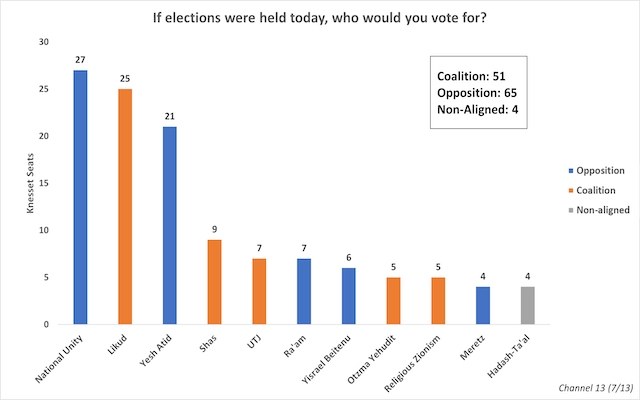Israel has witnessed a sharp divide in recent months concerning the issue of judicial reform, and tensions escalated further last week with the Knesset's passage of the law to reduce the "Reasonableness Clause." A recent survey conducted by "Israel Hayom" and the "Mind Pool" institute, under the guidance of Prof. Yitzhak Katz, sheds light on the current political landscape.
According to the survey, if Knesset elections were held today, Benny Gantz's Blue and White Party would emerge as the largest party with 28 seats, followed closely by the Likud with 27 seats, and Yesh Atid with 21 mandates. Despite efforts by the Labor Party to distinguish itself from Gantz and Lapid, adopting a more militant stance against the coalition, the party remains below the electoral threshold and still cannot secure enough support to enter the Knesset, despite being in the opposition. In contrast, the far-left party Meretz, currently unrepresented in the Knesset, garners 5 mandates in the poll, while the Arab-Israeli party Balad also falls short of the threshold. According to the survey, the coalition would hold 53 mandates, while the opposition, including the Arab-Israeli Hadash-Ta'al with a potential 4 seats, would hold 63 mandates.
Asked about whether the efforts to overhaul the judiciary were hurting or strengthening Israel, some 52% said they made Israel weaker while 26% said they made it stronger. https://t.co/Z3MBs6Xb2H
— Israel Hayom English (@IsraelHayomEng) July 28, 2023
The survey further delved into potential vote changes, revealing interesting figures. Notably, 13% of Likud voters and 31% of Yesh Atid voters expressed willingness to switch their support to Benny Gantz's party. Additionally, 23% of Religious Zionist and Otzma Yehudit voters indicated they would switch to the Likud.
Examining public satisfaction with the government's performance, the survey unsurprisingly found that 62% of respondents held a negative opinion. Even 30% of coalition voters and 41% of Likud voters expressed dissatisfaction with the government's performance.
Regarding judicial reform, the majority of respondents (52%) believed that it weakens the State of Israel, while only 26% perceived it as strengthening the nation. Moreover, 61% of those with an opinion opposed the reduction of the "Reasonableness Clause," compared to 39% in support. Intriguingly, a significant portion of Likud voters opposed the legislation passed during the week, with 24% expressing opposition, despite 63% supporting it.
New poll following passing of Reasonableness Bill suggests Gantz's National Unity would become largest party. @gantzbe https://t.co/46EzUg1DMn via @all_israel_news
— Joel C. Rosenberg (@JoelCRosenberg) July 26, 2023
The survey reflects the deeply polarized state of Israeli politics and the contentious nature of the judicial reform issue. The public's views on the government's performance and the impact of the legislative changes indicate a clear need for continued dialogue and consideration of various perspectives to foster unity and constructive progress for the nation.


